题目内容
Mike bought an old car cheaply,cleaned it up and sold it at a ______.
A. benefit B. bargain
C. profit D. prize
 初中学业考试导与练系列答案
初中学业考试导与练系列答案Less is more. This is why we say: reduce things by half instead of doubling them, relax instead of stressing, and slow down instead of speeding up. Apply these principles(原则) in your everyday life. You will then find yourself well along on your journey to simplification.
Separate Your Actions
When you concentrate on one task, you find you have energy that you didn’t even know you had. Just imagine: you have to carry two heavy pigs over 100 yards. If you carry two, it will take forever. But if you tie one pig in a place, pick up the other, gather all your strength and make a dash for the finish line, pause for a moment, run back and get the other one, and carry the second pig to the finish line, then you can be sure of success.
Say “No” Firmly
If you have the feeling that 24 hours per day are not enough for all the things you need to do, then it’s not because the day has too few hours, but because you have too many activities. The solution is equally simple: say no to accept so much work in your private life or your working life.
Allow Yourself to Be Weak
“I can deal with stress” is regarded as a positive statement in the world of work. People who can deal with stress are given more and more to --- until one day they break.
Pay careful attention to the signs that tell you that you are under more stress than you can deal with. If you become ill, or your work efficiency decreases, change your life goals. Say quite openly, “I can’t manage that.”
Stop Expecting Everything to Be Perfect
“If only I were slimmer, more beautiful, richer, more clever, then I would be happier.” This is a dream that makes a lot of people ill, and unhappy. Life is imperfect. Only those who accept this reality can lead a really full life.
Of course there are activities in which errors are dangerous: driving a car; crossing the road. But life doesn’t entirely have these things. In among them there is possibility that you may make small and large mistakes.
Escape Now and Then
Successful people all have their own places where they can be left alone in order to work. Find out which places improve your creativity. For me it’s the train. When I know that I’m going to be traveling for four hours without phone calls or people knocking on my door, I find my mind is free and I can read or write articles.
| |
Theme | Less is more, which helps you 2. a simpler life. |
3. to apply | Concentrate on one task, and you will find you are more 4. than you know and achieve 5. more easily. |
6. to accept too much work in your life. | |
Change life goals if you are under more stress than you can 7.. | |
8. yourself to make mistakes since life is not perfect. 9., you will be unhappy. | |
Find out where you can be left 10. to improve your creativity. | |


 e counter if she could come outside for just a minute. She looked at me as though I were from some other planet. She hesitated, and then seemingly against her better judgment, she moved toward the door.
e counter if she could come outside for just a minute. She looked at me as though I were from some other planet. She hesitated, and then seemingly against her better judgment, she moved toward the door.